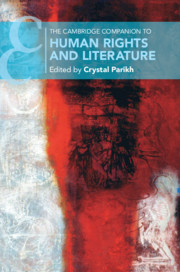Book contents
- The Cambridge Companion to Human Rights and Literature
- The Cambridge Companion to Human Rights and Literature
- Copyright page
- Epigraph
- Contents
- Notes on Contributors
- Chronology of Major Works and Events, 1215–2018
- Introduction
- Part I Genealogies and Contexts
- Part II Fashioning Methods
- Part III Generic Representations
- Part IV Writing Human Rights
- 14 Perpetrators, Victims, and Beneficiaries
- 15 Routing Emotions, Forming Humans
- 16 Beyond Sovereignty
- Select Bibliography
- Index
- Cambridge Companions To …
16 - Beyond Sovereignty
Reimagining Vulnerability and Security
from Part IV - Writing Human Rights
Published online by Cambridge University Press: 24 June 2019
- The Cambridge Companion to Human Rights and Literature
- The Cambridge Companion to Human Rights and Literature
- Copyright page
- Epigraph
- Contents
- Notes on Contributors
- Chronology of Major Works and Events, 1215–2018
- Introduction
- Part I Genealogies and Contexts
- Part II Fashioning Methods
- Part III Generic Representations
- Part IV Writing Human Rights
- 14 Perpetrators, Victims, and Beneficiaries
- 15 Routing Emotions, Forming Humans
- 16 Beyond Sovereignty
- Select Bibliography
- Index
- Cambridge Companions To …
Summary
Vulnerability theory, which identifies embodied vulnerability as the primary definition of human being, addresses some of the concerns and exclusions of other universalist definitions of the human. Social theorists and political philosophers have moved away from conceptions of the human grounded in various capacities, for example, to reason or to labor, and instead to vulberability. But vulnerability theory carries its own risks, insofar as precarious social and political structures can render vulnerable embodiment into abject victimhood, in opposition to, and in need of protection by, state power. This chapter conducts a close reading of Slahi’s Guantánamo Diary (2015) to show how literature can imagine alternate possibilities for vulnerability and security as well as the types of political community by which they are generated.
- Type
- Chapter
- Information
- The Cambridge Companion to Human Rights and Literature , pp. 217 - 232Publisher: Cambridge University PressPrint publication year: 2019

